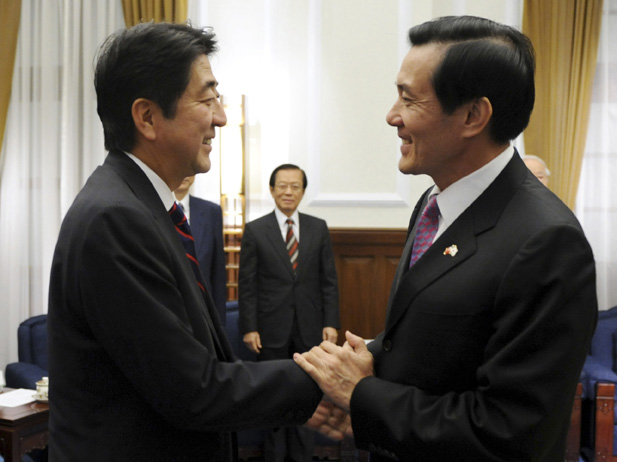More on:
Ayumi Teraoka is research associate for Japan studies at the Council on Foreign Relations.
Taiwan’s presidential and Legislative Yuan elections on Saturday were closely monitored in Japan, where deep historical, cultural, and social ties with Taiwan remain. Japan’s Ministry of Foreign Affairs (MOFA) released its official statement congratulating Tsai Ing-wen on her victory and assuring her that the Abe government would work toward “further deepening cooperation” with Taiwan. Japan’s strategic opportunities with Taiwan lie in further economic cooperation, and Chief Cabinet Secretary Yoshihide Suga’s statement of support this Monday for Taiwan’s entry into the Trans-Pacific Partnership (TPP) is a step in a welcome direction for Tokyo-Taipei relations in 2016 and beyond.
Interest in deepening Japan-Taiwan ties is mutual. During the run-up to her victory, Tsai visited Japan despite anticipated protest from Beijing to strengthen economic ties and in particular to seek Tokyo’s support for her nation’s participation in the TPP. During this October visit, she met with members of a bipartisan Japan-Taiwan Diet caucus and with the leadership of the ruling Liberal Democratic Party (LDP). Rumor has it she even met with Prime Minister Shinzo Abe, who had cultivated ties with Taiwan’s Democratic Progressive Party (DPP) when he visited Taiwan in 2011 and 2012 while his party was out of power. Abe’s brother, Nobuo Kishi, also leads another pro-Taiwan group in the Diet, and Tsai visited the Yamaguchi districts of both, a gesture designed to highlight her personal ties to the Abe family.
Despite the lack of formal diplomatic ties, polls indicate that Japan continues to be the most favored country in Taiwan, and in 2011, 67 percent of the Japanese people also said they feel close to Taiwan. On the economic front, Japan is Taiwan’s second largest trading partner while Taiwan is Japan’s fifth largest. Despite its relatively small population (twenty-three million), the number of Taiwanese visitors to Japan each year is the third largest, following South Korea and China. These grassroots ties were amply reflected in the Taiwanese response to the 2011 Great East Japan Earthquake. Donations reached a total of 2.92 billion yen ($31.3 million), making Taiwan the second largest donor of relief funds in the world after the United States.
Japan and Taiwan have not been spared from the difficult historical issues and territorial disputes that trouble Tokyo’s relations with Beijing and Seoul, however. Taipei also claims the islands in the East China Sea that Beijing and Tokyo have clashed over—the islands Taiwanese refer to as the Diaoyutai—and there is lingering resentment in Taiwan over Imperial Japan’s wartime treatment of Taiwanese women who were forced to work in military brothels. Nonetheless, Taipei and Tokyo have found common strategic interests that outweigh some of these residual wounds of the past. In April 2013, under President Ma Ying-jeou’s East China Sea Peace Initiative, Japan and Taiwan finally concluded a long sought-after fisheries agreement that allowed Taiwanese fishermen to operate in a part of what Japan regards as its Economic Exclusive Zone and established a dispute resolution framework for the fishermen. Frustration remains among Japanese fishermen over the fishing practices of Taiwanese trawlers, but this agreement has set a positive precedent for managing the difficult territorial disputes in the East China Sea.

Traditionally, the LDP leadership’s ties with Taipei have largely been forged through the Kuomintang (the Nationalist Party). Abe’s ability to work with Ma on the East China Sea early on in his tenure was in large part due to these longstanding party ties. In contrast, the DPP has had little contact with Japan’s conservatives. Moreover, the DPP’s dreams of declaring independence from China in the mid-2000s as represented in former President Chen Shui-bian’s call for a referendum for Taiwan’s participation in the United Nations, rattled many in Tokyo as tensions between Taiwan and Beijing escalated. Yet today, Tsai and Abe are attempting to forge a new political partnership as regional concern over Chinese behavior mounts. Tokyo’s recent tensions with Beijing have yet again prompted some Diet members to advocate for a deeper relationship with their southern, democratic neighbor by establishing a Japanese version of the Taiwan Relations Act. Scholars also call for elevating Japan’s relations with Taiwan to reflect the changing nature of cross-strait relations represented in the first-ever summit between the heads of China and Taiwan last November.
Japan cannot simply sit back and “expect” the issues surrounding Taiwan to be “resolved peacefully by direct dialogue between the concerned parties,” as outlined in the MOFA statement. Rather, the Abe cabinet, as part of its “proactive contribution to peace,” should see what it can do to best ensure such an outcome. Japan’s direct support for Taiwan’s security, as implied in the concept of Japan’s Taiwan Relations Act, however, may do little more than imperil Tokyo’s relations with Beijing while creating unnecessary tensions between Taipei and Beijing. Instead, Japan should pursue its strategic interests through further economic cooperation with Taiwan.
An obvious first step would be to support Taiwan’s participation in the TPP, as Tsai advocated during her time in Japan. Suga’s statement on Monday was a much-welcomed step in this regard, and Japan must work with the United States and other parties of the TPP to garner support and assistance for Taiwan’s participation. The TPP is a high-standard free trade initiative that should be open to all member economies of the Asia-Pacific Economic Cooperation forum (APEC), which includes “Chinese Taipei.” Ensuring an economically vibrant Taiwan and supporting regional economic integration would not only strengthen ties with Taiwan, but also demonstrate Japan’s willingness to work with those in the Asia-Pacific region who have a demonstrated commitment to peaceful dispute resolution.
More on:
 Online Store
Online Store
